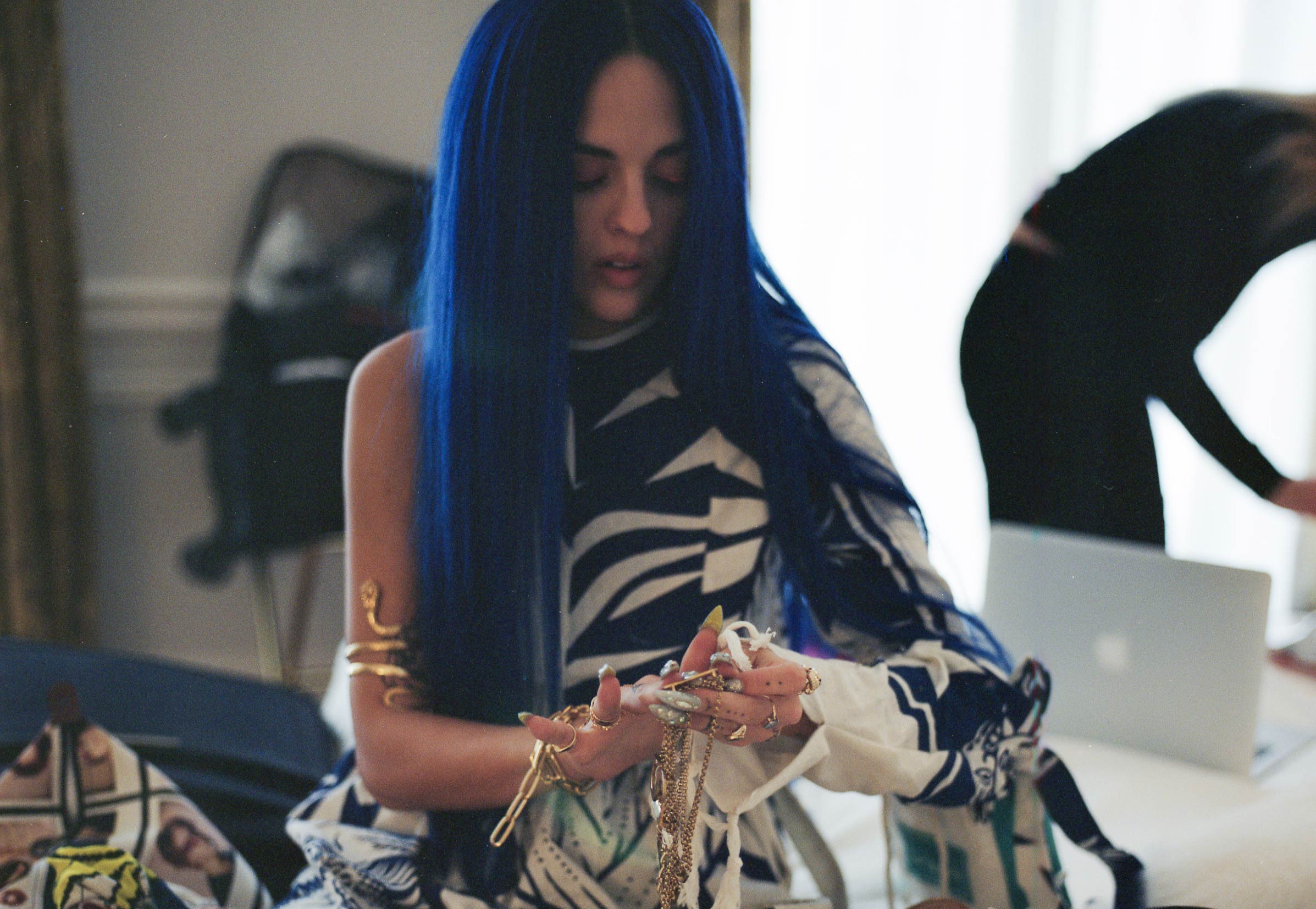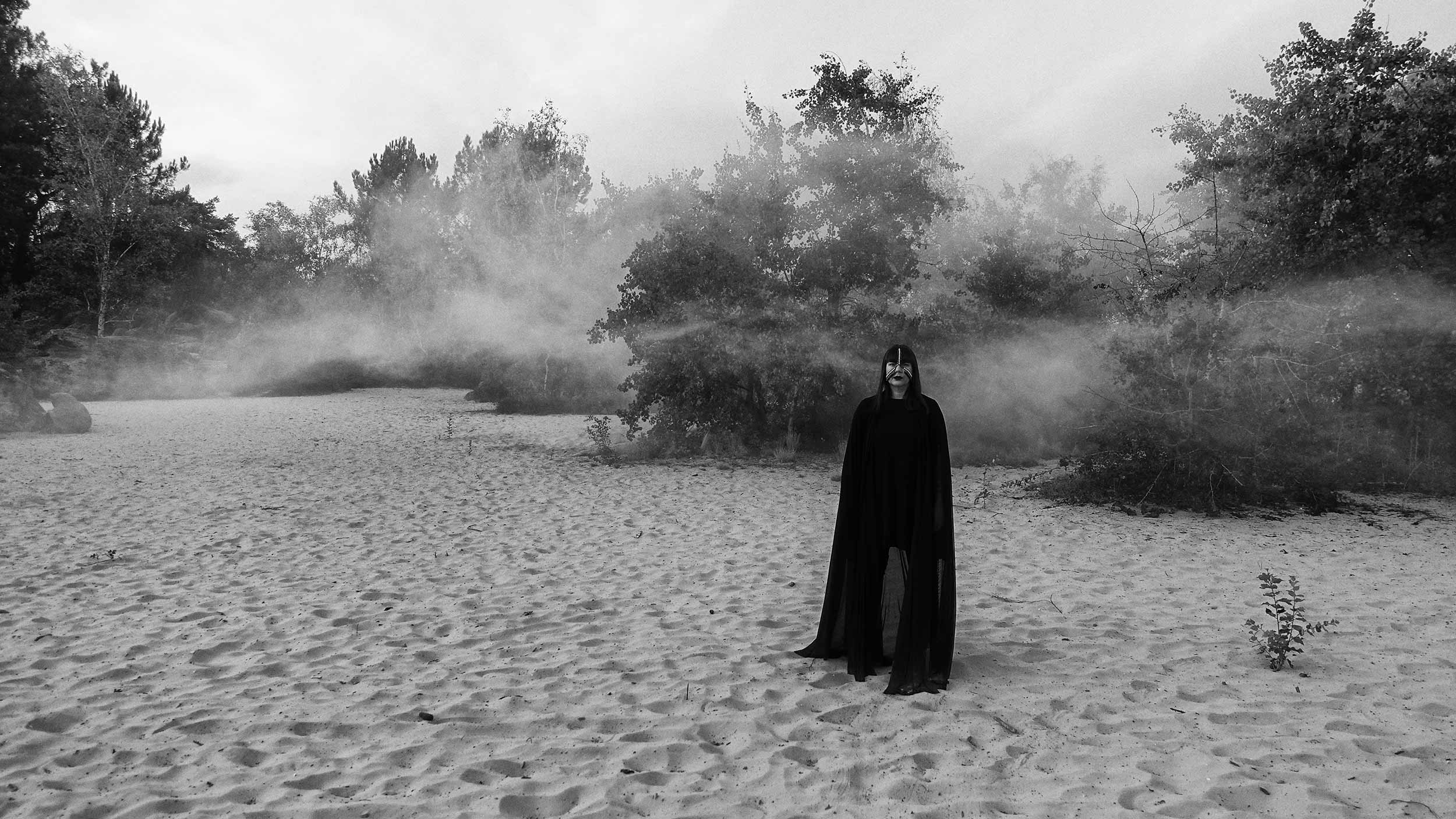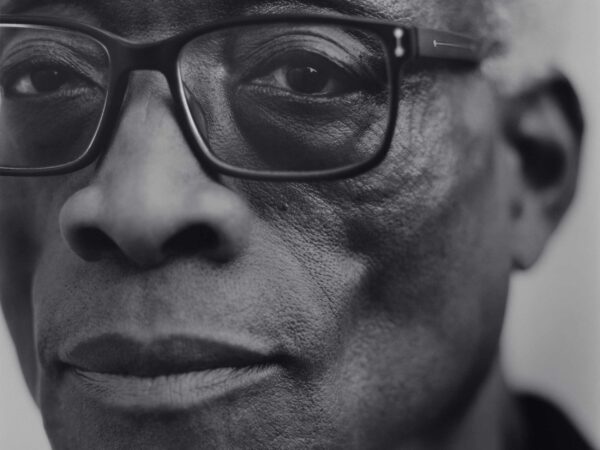The self-described technoprincess talks to Caroline Hervé (Miss Kittin) about proving yourself in an image-obsessed world.
In the underground electroclash heyday of 2001, Miss Kittin & The Hacker released what’s probably the French duo’s best-known track, “Frank Sinatra.” A scrappy dance anthem drenched in satirically decadent lyrics about cocaine and caviar, it helped make The Hacker and Miss Kittin (real name Caroline Hervé) known amongst the very crowd they were disparaging, much to the musicians’ horror. But the popular track also gave fuel to a new generation of geographically isolated club kids. Amongst them, techno DJ and fashion model Sita Abellan, who has consistently cited Hervé as one of her greatest inspirations. Early electroclash deep cuts appear in Abellan’s brilliantly abrasive sets alongside industrial German techno, as well as stuff she stumbled across in Tokyo while spinning at Arc. And 2019 is only getting bigger for both women. Abellan just returned from the Paris Fashion Week men’s shows, and will play Germany’s Klub PAN next weekend before launching her own jewelry line, Lilith, in February. Hervé recently dropped her first album in five years, Cosmos, marking a return to her underground roots and a rejection of structural conventions.
Document got Abellan and Hervé on the phone to talk about misogyny, social media, and why the secret to a long career is pissing people off.
Sita Abellan—You were talking about social media. It makes things easier for artists, obviously. People from all over the world can play your music and recognize you. How were you doing it before?
Caroline Hervé—Yeah, you’re right. It’s a very good question! How did we do it before? We tend to forget. For example, we had a phone number you would call, and you would end up on an answering machine giving you a meeting point—say in a supermarket—and you would drive there and wait for a car to come and tell you, ‘Follow me to go to the party.’ That’s how I discovered techno music. And I loved that. Later, as a DJ, we had agents—like today—and they booked us in clubs. But now, if you invest money into a public relations company, you can have a career. Before, you had to really produce good music or have something very special to attract attention. Today, you can create that.
Sita—So right now it’s easier to get recognized even if you don’t have the talent?
Caroline—I think it’s harder to be recognized for your work if you’re good. That’s the difference. If you’re good, you can get lost in the mass of other artists who maybe aren’t as good as you but are smarter or more into marketing. Today, I think talent is really not the main quality you need to have to succeed. But, luckily, there is still something that you can’t create and you can’t produce. It’s authenticity, sincerity, being true, and being a very strong personality. [That’s] something you cannot create via social media. Thank God.
Above The Fold

A Trace of the Real

Slava Mogutin: “I Transgress, Therefore I Am”

In Taiwan, American Designer Daniel DuGoff Finds Revelation

Introducing: Nabil Nayal, 2017 LVMH Prize Finalist
Sita—I’m from a very small town in the south of Spain. My interest in music started because I used to be a club kid, you know? I used to go out a lot, and I had a big interest, since I was very young, in fashion. I used to dress myself up in crazy things. And being from a small town, everybody was looking at me. Social media helped me put a foot in the door of the fashion world some years ago. But it’s true…I love fashion, and love doing that, but with social media, everything is kind of overrated, you know?
Caroline—I think fashion is more like visual art. For that, Instagram is perfect, because it’s very visual. But still it’s not good, because at the end, everyone has access to it, and you can fool the public and say things that maybe are not even real, you know what I mean?
Sita—Yeah, I agree.
Caroline—When you start to be successful with your own ideas and your own style, it’s typical that the industry will try to take that from you. I think it’s important to resist that. When artists start to have personality and start to catch attention, it’s high value for the industry. If you’re not careful to take care of your value that you created as an artist, the industry will just use it and throw you away when the hype is over. Then you are upset, you are depressed, and you start looking for another job, because it’s over. That’s what we did with The Hacker when our music started to be played in fashion shows. We were like, ‘What the fuck?’ Because the song ‘Frank Sinatra’ is about that.
Sita—It’s making fun of that, right?
Caroline—Yeah. It’s against that. I feel honored that people are interested in my music, but they are using my rebellion for their own thing. It’s mine—I don’t want this to be their thing.
Sita—You didn’t like that brand?
Caroline—Well, we did a photoshoot with [Karl] Lagerfeld and I’m still in touch with the guy who makes the music for a lot of the fashion shows…
Sita—Michel Gaubert?
Caroline—Michel Gaubert. I texted him, like, two hours ago. But I never wanted to play for fashion shows. I never wanted brands to give me clothes. It was important for me to stay independent from fashion. Even though I like fashion, I didn’t want to become an instrument. It’s dangerous.
Sita—I know what you mean. The fashion industry is different.
Caroline—I love fashion, and when I was young, I had a lot of fun with it. But like you say—the fashion industry is different. You go to fashion week, and you find a lot of people that just go there because they want a picture. They don’t go there because they’re really interested in the clothes. If you’re a musician, you should always remember why you are doing what you do. You certainly don’t do music to become a fashion icon, or to be in fashion magazines or whatever. You make music because you have something to say…I think for fashion designers it’s the same. I’m sure they know how to isolate themselves to create a great collection. You have to stay strong to survive a trend.
Sita—Because then you become a trend. I am a very impatient person and I want everything to happen at the same time. But what becomes a trend easily will become nothing easily too. What goes up goes down in a second.
Caroline—Yeah. The topic of time—it’s very important, what you said. I just read something about ego in our society—if it’s a disease or if it’s necessary. This social guy said that we have to find inside ourselves what is timeless, and what can’t be copied. We have to find inside ourselves what survives time. It’s about the obsession with being young, tricking all the wrinkles, perfection, and never aging. It was great to hear that because that’s how I feel—about music and about art and everything in general.
Sita—When you were starting your music, did you go through this thing of people thinking that men are better DJs than women, and all that kind of shit? I just came from fashion week where the techno scene is a very tough thing to understand, as you know. Because I come from the fashion world, people will think… I have got comments from men telling me, ‘You’re not a good DJ.’ Did you experience this kind of industry thinking?
Caroline—Of course I did. But it’s always linked with ignorance. My friends, for example, they always saw me involved in music, and they never treated me in a different way. When I started to DJ in other places, because there were very few women, people were disrespectful, because it was a different time too—people would make [those comments] all the time, not just for women DJs but for women in general. In some way I had to educate them by showing I was cool and I didn’t want to beat them. And it worked. I think the topic took another dimension when electronic music became a big business. Back then, this music was underground. Yes, there was money involved, but not like now. When there is big money involved, men don’t want women to have a piece of the cake…
Sita—I want to know more about the scene in the 2000s. You were who brought me—you and The Hacker—into that kind of music. You are an idol for me.
Caroline—Wow, thank you so much. Thank you!
Sita—I respect your work so much. I like many artists from that scene and I got my inspiration from there. Tell me more about that scene in the 2000s.
Caroline—Basically we were just kids from a small town, and for fun we wrote this crazy track [“Gratin Dauphinois”] with crazy vocals. We didn’t think for a second that someone would release it. We thought it was too provocative and too violent but too cheesy at the same time. But when DJ Hell did, then we met Tiga and we met Terence Fixmer, who was already in the crew with Vitalic. They were before us and were the people who influenced us. When Fischerspooner arrived, and when fashion got involved in our movement and this music was played in New York fashion clubs, for us it was over. It’s exactly like punk. When Sex Pistols took over punk, it was over. Punk was created by Iggy Pop and The Stooges, you know? Like, five years before Sex Pistols. [Electroclash] became very glamorous. The darkness and the punk attitude was kind of gone, in a way. I don’t say the music wasn’t cool—I think it was cool. But I didn’t think we were part of it…
“There are artists who want to follow a trend and they want to be accepted by a certain kind of family, and you have artists who don’t feel home in any family.”—Caroline Hervé
But it was so much fun, from ‘96 to 2001 we were playing in crazy underground clubs in East Germany. The conditions were really rough—we were traveling alone with no sound engineer and no business class tickets [laughs]. We were playing in techno clubs that didn’t want to hear a live show. These people were moving away from rock. They just wanted to be in a square room with a strobe light and listening to hard techno. Suddenly there was this kind of new wave—a girl and a boy—and at the beginning it was really hard. But that’s what makes it so cool, in a way. You have to fight to prove your music and people have so much respect for that in the end.
Sita—Yeah. I know what you mean. When I started playing, I had done Rihanna’s music video, and there were people who would come to me and tell me, ‘You should start playing hip-hop now, because you’re gonna be successful, because all your friends are rockers.’ And I’m like, ‘I have nothing to do with hip-hop. All my friends are rockers, whatever!’ I don’t even listen to hip-hop. I’m not gonna do that. I’m just gonna stick to what I want to do. In the beginning it was difficult because sometimes I play really hard techno and maybe it’s very difficult for everyone to listen to, especially if people didn’t think I was going to play that type of music.
Caroline—What you’re saying is exactly what we are here for, as artists. There are artists who want to follow a trend and they want to be accepted by a certain kind of family, and you have artists who don’t feel home in any family. They have something different and they fight to impose their vision. I think these people can only have a long career. Because what you said—you always bring something people don’t expect…When you manage to do that, and if you can make it a second time and a third time, then it’s great. It’s the hardest thing to do. But in music history you see people like David Bowie and they brought something that no one expected. That’s very hard to do, even now…
When the audience comes to a club or a show, maybe in fashion as well, they want to be surprised. They want to be taken on a journey. They may not like it at first, but they go home and they say, ‘Maybe I didn’t like it but it was different.’ Maybe they don’t understand it right away, but you marked their spirit. That’s what I expect when I listen to another DJ. Most people play what the crowd expects or what the promoter expects. Even in hard techno, if you play a melody, it’s like it’s wrong. There are very few places where you can really do what you want. Nowadays it’s even harder to be adventurous, I think. But some people have to do it, otherwise everybody wears the same clothes and listens to the same music, and that’s not what we want, you and I.
Sita—Yeah. Definitely.
Caroline—So we have to keep on working, and be strong, and be surrounded by people who push us in this direction, who give us the input to constantly create something new. Sometimes we succeed, sometimes not, but we have to try ‘til we die, I think.









